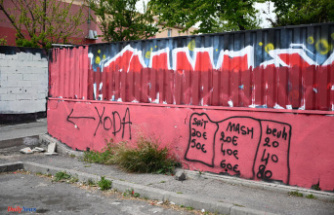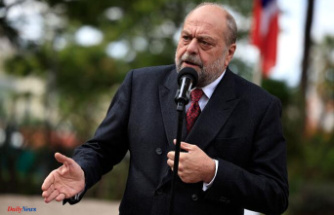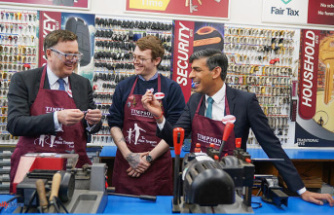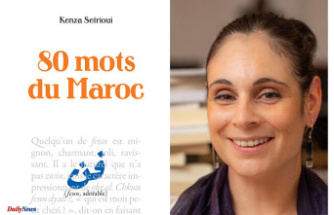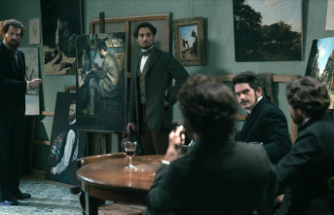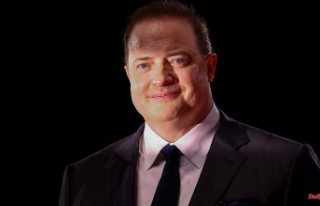Stars, folk festival, party atmosphere: Thousands of people celebrate at the Superbloom Festival in Munich's Olympiapark at the weekend. It should be a party without barriers. Our blind colleague tested how accessible the Superbloom really was.
It's Saturday, September 3rd, early afternoon. I've finally arrived at the Superbloom Festival where a friend and colleague was waiting for me. He will accompany me to the event.
It's a festival of long journeys. The Olympic Park in the north of Munich is 850,000 square meters. You can take 46 million steps there. After two days my feet will feel dead heavy. And in the end I only saw a small part of the festival - I'm talking about "seeing", although I can't do that with my eyes. I use the rest of my senses, my friend does the reporter.
Eleven "Experience" areas are offered, circus and beauty, politics with lots of events and discussions. Amnesty International is on site, even yoga classes are offered. But the focus is on fun: there is plenty of room for children, various stands with currywurst, falafel and co. - and 60 bands and artists from all musical genres on six concert stages. That sounds almost overambitious. But after two years of Corona, the Berlin agency Goodlive and Superbloom boss Fruzsina Szép simply wanted a huge party with something for everyone.
People with disabilities are usually excluded from such major events. That should be different with the Superbloom. Wheelchair users do not have to climb any steps, but have to sit on a special grandstand at concerts in the Olympic Stadium. Deaf people can feel the sound at almost all concerts. Many "food stalls" have food and drink menus for the blind. To "read" they need a smartphone whose camera scans and activates a QR code. The price list then appears on the smartphone screen and is read out by an artificial voice.
After some problems with the entrance in the morning, everything is now running smoothly, the sun is shining. Still.
I meet Ron Paustian. He likes to call himself a "problem solver". You don't notice his mental handicap. She opened his eyes to other people's problems. Now he advises organizers of festivals, creates hygiene concepts, acts as a speaker and organizes training courses. And he founded "Inclusion must be loud". The non-profit organization helps people with disabilities to organize their free time as freely as possible. The volunteers used to accompany people with disabilities to concerts in particular, but now they attend every conceivable event: from the sex fair to the Munich Oktoberfest, from the folk music festival in Bavaria to the metal festival in Wacken.
Paustian made his first experiences there. "There is no such thing as barrier-free access, at most there is a lack of barriers," he says. And he's right: My most important barrier is, for example, my visual impairment, and nobody can take that away from me, I can deal with that on my own.
Paustian prefers to speak of "accessibility". I ask him what the difference is. He explains: In Wacken, for example, the subsoil turns into a muddy landscape after it rains. Accessibility would be solid ground, but most fans didn't want that. "For us, accessibility means that in an emergency, four people are immediately on hand to pull the wheelchair and driver out of the mud and even carry it to the stage." Rolli - that's what many wheelchair users call the vehicle they use to move forward.
Paustian estimates that around 300 people with disabilities took advantage of the Superbloom barrier concept on the first day. Sounds little. But there are 300 people who need help in a particular emergency. And it won't be long in coming.
We've just finished our conversation when the severe weather warning comes in - rain, thunderstorms. The guests should shelter in the Olympic Hall. And then there is a break. All outstanding accounts close, nothing works anymore.
We are now sitting in the Olympic Stadium, waiting for a concert by synth artist Years
After almost two hours we continue, but still not completely smoothly. With main act Calvin Harris, too many fans want to go to the stadium. At some point the festival management has to close it.
We're partying again - with Harris' ex-swarm Rita Ora, who has a lot of fun with her performance and sweeps her fans away.
Superbloom boss Szép is asked about the breakdowns on Sunday afternoon. "Since Corona, nothing is like it used to be," she says. Many festival specialists would have looked around for other jobs. "We practically had to start from scratch again." But you learn something new every day. And the organizers learned overnight: More entrances are open on Sunday, the sound system in the Olympic Stadium has been reset.
And what about accessibility? A team of 20 volunteers is always on site. No problem. But Ron Paustian would have wished for even more: Low-mounted signs, for example specifically for wheelchair users, illuminated signs for people with poor eyesight. But his biggest dream: "I would like to have shuttle traffic between the stages for the disabled and the elderly."
For me, too, the long distances are the biggest barrier this weekend. It is clear to me: I would not have been able to move through this huge festival on my own. So my friend guided me. He provided us with hamburgers and beer during the concert breaks and described rapper Macklemore's show to me. But I took him to the event free of charge: Almost all organizers allow people with disabilities to accompany them free of charge - voluntarily. This is not regulated by law in Germany.
Festival boss Szép also has a dream, she answered my question at the final press conference: even more support for the deaf. And then she talks about her father, who went blind at the age of six. Tears come to her eyes as she remembers the many family walks through the Olympic Park.
"Accessibility is important to me," she says. "My father always told me: Use not only your eyes to see, but everything you have."


